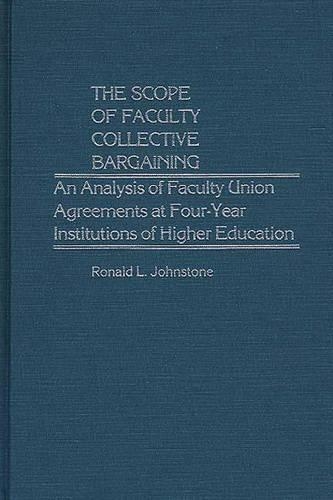
The Scope of Faculty Collective Bargaining: An Analysis of Faculty Union Agreements at Four-Year Institutions of Higher Education
(Hardback)
Publishing Details
The Scope of Faculty Collective Bargaining: An Analysis of Faculty Union Agreements at Four-Year Institutions of Higher Education
By (Author) Ronald L. Johnstone
Bloomsbury Publishing PLC
Praeger Publishers Inc
24th December 1981
United States
Classifications
Tertiary Education
Non Fiction
Industrial relations, occupational health and safety
Labour / income economics
331.89041378120973
Physical Properties
Hardback
196
Reviews
Johnstone presents a broad range of data in a highly readable text. He analyzes the contents of 89 collective-bargaining agreements pertaining to four-year public and private institutions of higher learning (95 percent of all such agreements, representing 98 percent of all unionized campuses as of December 31, 1979). Johnstone's analysis includes two variables that may affect the type of negotiated areas: the relative prestige of the institution and its basis of support (public or private). His comprehensive treatment reveals exactly what has been bargained at the various institutions....Johnstone addresses issues of collegiality and the essentially complementary roles of faculty and administration in the bargaining process. His book encourages a positive, constructive attitude in the relatively young area of collective bargaining in higher education. Recommended for both teachers and administrators involved in this process and for university libraries.-Choice
"Johnstone presents a broad range of data in a highly readable text. He analyzes the contents of 89 collective-bargaining agreements pertaining to four-year public and private institutions of higher learning (95 percent of all such agreements, representing 98 percent of all unionized campuses as of December 31, 1979). Johnstone's analysis includes two variables that may affect the type of negotiated areas: the relative prestige of the institution and its basis of support (public or private). His comprehensive treatment reveals exactly what has been bargained at the various institutions....Johnstone addresses issues of collegiality and the essentially complementary roles of faculty and administration in the bargaining process. His book encourages a positive, constructive attitude in the relatively young area of collective bargaining in higher education. Recommended for both teachers and administrators involved in this process and for university libraries."-Choice
Author Bio
hnstone /f Ronald /i L.
